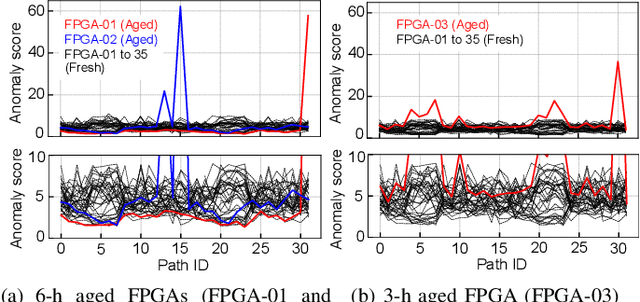Foisal Ahmed
Unsupervised Recycled FPGA Detection Using Symmetry Analysis
Mar 03, 2023Abstract:Recently, recycled field-programmable gate arrays (FPGAs) pose a significant hardware security problem due to the proliferation of the semiconductor supply chain. Ring oscillator (RO) based frequency analyzing technique is one of the popular methods, where most studies used the known fresh FPGAs (KFFs) in machine learning-based detection, which is not a realistic approach. In this paper, we present a novel recycled FPGA detection method by examining the symmetry information of the RO frequency using unsupervised anomaly detection method. Due to the symmetrical array structure of the FPGA, some adjacent logic blocks on an FPGA have comparable RO frequencies, hence our method simply analyzes the RO frequencies of those blocks to determine how similar they are. The proposed approach efficiently categorizes recycled FPGAs by utilizing direct density ratio estimation through outliers detection. Experiments using Xilinx Artix-7 FPGAs demonstrate that the proposed method accurately classifies recycled FPGAs from 10 fresh FPGAs by x fewer computations compared with the conventional method.
Systematic Unsupervised Recycled Field-Programmable Gate Array Detection
Apr 05, 2022



Abstract:With the expansion of the semiconductor supply chain, the use of recycled field-programmable gate arrays (FPGAs) has become a serious concern. Several methods for detecting recycled FPGAs by analyzing the ring oscillator (RO) frequencies have been proposed; however, most assume the known fresh FPGAs (KFFs) as the training data in machine-learning-based classification. In this study, we propose a novel recycled FPGA detection method based on an unsupervised anomaly detection scheme when there are few or no KFFs available. As the RO frequencies in the neighboring logic blocks on an FPGA are similar because of systematic process variation, our method compares the RO frequencies and does not require KFFs. The proposed method efficiently identifies recycled FPGAs through outlier detection using direct density ratio estimation. Experiments using Xilinx Artix-7 FPGAs demonstrate that the proposed method successfully distinguishes recycled FPGAs from 35 fresh FPGAs. In contrast, a conventional recycled FPGA detection method results in certain misclassification.
 Add to Chrome
Add to Chrome Add to Firefox
Add to Firefox Add to Edge
Add to Edge